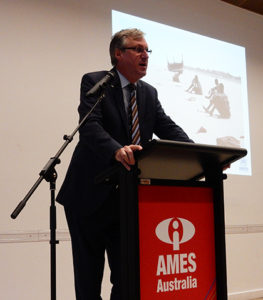Global compact needed to relieve refugee crisis
The UNHCR’s fact sheet reads like recipe for despair.
Currently, across the globe, there are 65 million people who are displaced, 3 million seeking asylum, 21 million declared refugees, 40 million internally displaced and 10 people million who are stateless.
Cash strapped and internally fractious Turkey is hosting the largest number refugees with 2.5 million and Lebanon, which has been almost sent broke by hosting more than a million refugees, has the highest number as a proportion of its population.

Thomas Albrecht
There are 24 people being displaced from their homes each minute. The UN has submitted 120,000 refugees for resettlement in 2016 and plans to submit 143,000 next year and 170,000 in 2018 – but this falls far short of the number of those in need.
So what to do about this crisis?
Well, hope is emerging in the form of a ‘global compact’ of nations that will see agreement over the equitable sharing of the responsibility for the protection of refugees.
UNHCR Regional Representative for Australian and the Pacific Thomas Albrecht outlined the details of the compact at a recent briefing to staff at migrant and refugee settlement agency AMES Australia.
Mr Albrecht said the UNHCR’s greatest current mission is to achieve the equitable and reasonable sharing of the responsibility for protecting refugees.
He said the global compact held out hope for a framework to cope with large scale movements of people but international cooperation was needed for it to succeed.
“In Somalia and Afghanistan, we have seen people fleeing their homes multiple times. Most are remaining in their own countries but some are crossing borders and even crossing deserts and oceans to find safety; we saw one million cross the Mediterranean in 2015,” Mr Albrecht said.
“Environmental degradation and food insecurity are further driving the displacement of people. In South Sudan, we have seen recently that hunger has driven people from their traditional homes.
“The prevention of conflict effectively needs to be a global responsibility. The institution of asylum must be respected and preserved and reinforced but a number of countries have eroded their responsibility.
“This is driving refugee movements underground and people smugglers are capitalising on this.
“Failure to abide by the International Refugee Convention was not a failure of the convention but a failure of political leadership. This institution has saved millions of lives,” Mr Albrecht said.
He said that effective protection of refugees required a well ordered and ethical approach.
“We are seeing growing hostility to affording protection to refugees and popular politicking has heightened the problem,” Mr Albrecht said.
“Many refugees flee discrimination and xenophobia only to face similar problems in their new countries. Real political leadership is needed.
“It is understandable there are security fears over refugees but security and protection need to go hand in hand.
“In the security debate it is important to not forget that often the victims of terror are Muslims themselves,” he said.
Mr Albrecht said that 90 per cent of refugees were being hosted in developing regions in close proximity to armed conflict.
“The scale of the displacement has seized international attention but so far there has been no predictable means of solving the response gap,” Mr Albrecht said.
But he said looking at the issue of refugee displacement from an economic perspective might bring unexpected solutions.
“The potential for refugees to contribute economically and socially to their host nations is often overlooked and we must make the case for it,” Mr Albrecht said.
Laurie Nowell
AMES Australia Senior Journalist












